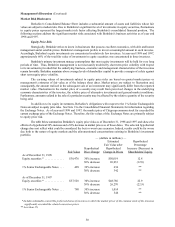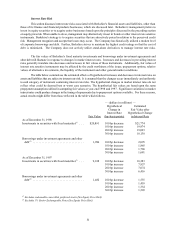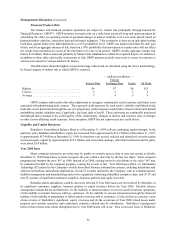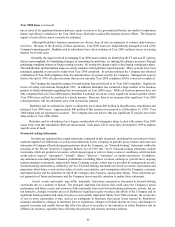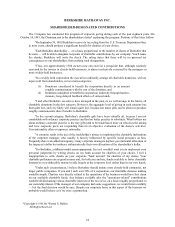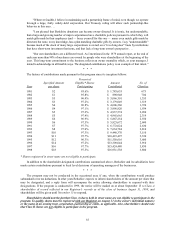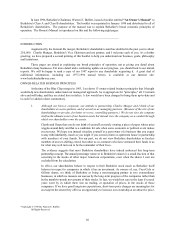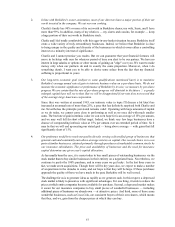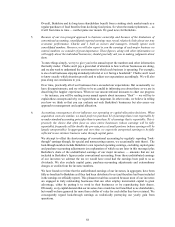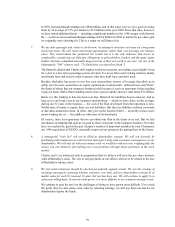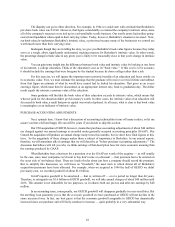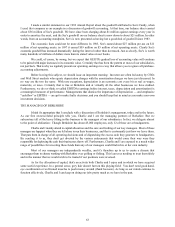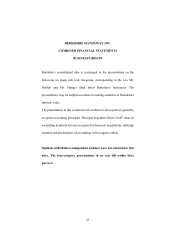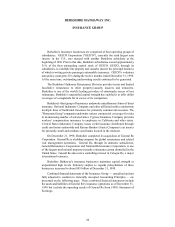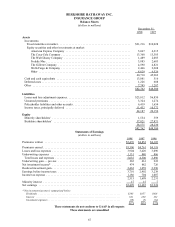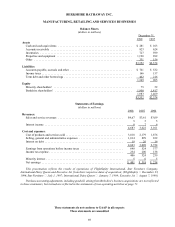Berkshire Hathaway 1998 Annual Report Download - page 61
Download and view the complete annual report
Please find page 61 of the 1998 Berkshire Hathaway annual report below. You can navigate through the pages in the report by either clicking on the pages listed below, or by using the keyword search tool below to find specific information within the annual report.
60
10. We will issue common stock only when we receive as much in business value as we give. This rule
applies to all forms of issuance — not only mergers or public stock offerings, but stock-for-debt
swaps, stock options, and convertible securities as well. We will not sell small portions of your
company — and that is what the issuance of shares amounts to — on a basis inconsistent with the
value of the entire enterprise.
When we sold the Class B shares in 1996, we stated that Berkshire stock was not undervalued —
and some people found that shocking. That reaction was not well-founded. Shock should have
registered instead had we issued shares when our stock was undervalued. Managements that say or
imply during a public offering that their stock is undervalued are usually being economical with the
truth or uneconomical with their existing shareholders' money: Owners unfairly lose if their
managers deliberately sell assets for 80¢ that in fact are worth $1. We didn't commit that kind of
crime in our offering of Class B shares and we never will. (We did not, however, say at the time
of the sale that our stock was overvalued, though many media have reported that we did.)
11. You should be fully aware of one attitude Charlie and I share that hurts our financial performance:
Regardless of price, we have no interest at all in selling any good businesses that Berkshire owns.
We are also very reluctant to sell sub-par businesses as long as we expect them to generate at least
some cash and as long as we feel good about their managers and labor relations. We hope not to
repeat the capital-allocation mistakes that led us into such sub-par businesses. And we react with
great caution to suggestions that our poor businesses can be restored to satisfactory profitability
by major capital expenditures. (The projections will be dazzling and the advocates sincere, but, in
the end, major additional investment in a terrible industry usually is about as rewarding as
struggling in quicksand.) Nevertheless, gin rummy managerial behavior (discard your least
promising business at each turn) is not our style. We would rather have our overall results penalized
a bit than engage in that kind of behavior.
We continue to avoid gin rummy behavior. True, we closed our textile business in the mid-1980's
after 20 years of struggling with it, but only because we felt it was doomed to run never-ending
operating losses. We have not, however, given thought to selling operations that would command
very fancy prices nor have we dumped our laggards, though we focus hard on curing the problems
that cause them to lag.
12. We will be candid in our reporting to you, emphasizing the pluses and minuses important in
appraising business value. Our guideline is to tell you the business facts that we would want to know
if our positions were reversed. We owe you no less. Moreover, as a company with a major
communications business, it would be inexcusable for us to apply lesser standards of accuracy,
balance and incisiveness when reporting on ourselves than we would expect our news people to
apply when reporting on others. We also believe candor benefits us as managers: The CEO who
misleads others in public may eventually mislead himself in private.
At Berkshire you will find no "big bath" accounting maneuvers or restructurings nor any
"smoothing" of quarterly or annual results. We will always tell you how many strokes we have
taken on each hole and never play around with the scorecard. When the numbers are a very rough
"guesstimate," as they necessarily must be in insurance reserving, we will try to be both consistent
and conservative in our approach.
We will be communicating with you in several ways. Through the annual report, I try to give all
shareholders as much value-defining information as can be conveyed in a document kept to
reasonable length. We also try to convey a liberal quantity of condensed but important information
in our quarterly reports, though I don't write those (one recital a year is enough). Still another
important occasion for communication is our Annual Meeting, at which Charlie and I are delighted
to spend five hours or more answering questions about Berkshire. But there is one way we can't
communicate: on a one-on-one basis. That isn't feasible given Berkshire's many thousands of
owners.


